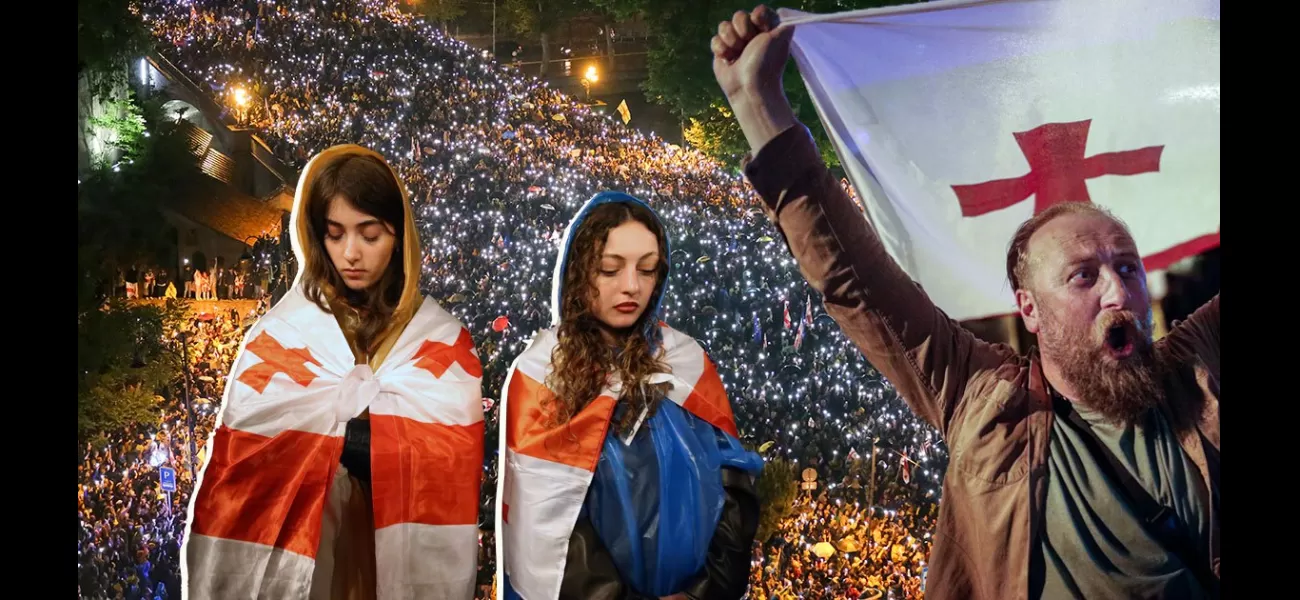Why did so many protesters gather in Georgia's streets last night?
Protesters urge Georgian government to reject controversial law on "foreign influence" that could stifle dissenting opinions.
May 12th 2024.

Over the weekend, Georgia was the site of a massive public demonstration, with hundreds of thousands of people taking to the streets of Tbilisi to voice their opposition to the government's proposed legislation on foreign influence. This was the largest gathering of its kind in decades, drawing in a significant portion of the country's population. According to OSINT analysis, there may have been as many as 480,000 demonstrators, making up 15% of the total population.
The ongoing protests, now in their fourth week, have been compared to the pro-democracy Rose Revolution of 2003, which saw a change in leadership and a move towards closer ties with the Western world. This latest demonstration, however, is focused on protecting the country's future from what many see as a pro-Russian government.
On Monday morning, demonstrators will once again gather outside the Georgian parliament to blockade lawmakers from entering and passing the controversial bill. But before that, let's take a closer look at why these protests are happening and what has transpired so far.
One protester, Nodar, a 31-year-old software engineer, explained that he is there to defend his country's future from a government that he sees as being controlled by Russian interests. The draft law being discussed by parliament has been criticized for its similarities to measures used by Russia to suppress dissent during the conflict in Ukraine. The European Union has warned that this legislation could jeopardize Georgia's bid for membership in the bloc, something that is widely supported by the Georgian people.
It is believed that the requirements for EU membership go against the interests of Bidzina Ivanishvili, the oligarch founder of the ruling Georgian Dream party. Ivanishvili made his fortune in Moscow and has been accused of having close ties to Russian interests. This has led to calls for sanctions against him and other members of his government who are perceived as being sympathetic to the Kremlin.
Drone footage taken during the protests showed a staggering number of people, with estimates ranging from 169,000 to 200,000 in attendance. This represents 15% of Georgia's population and is being described as the largest mobilization in recent memory.
The protests have been met with significant violence from police and security forces, echoing a similar situation last March when the government first attempted to pass the same law. Opposition leaders have been injured and arrested, along with dozens of other protesters. Despite this, the demonstrators remain determined, with one student, Ani, stating that they will continue to gather every night until the bill is withdrawn.
The government's response to the protests has been harsh, with a crackdown on opposition voices and physical attacks on opposition figures and their families. This has only further fueled the anger of the demonstrators, who fear what will happen if the bill is passed into law.
As the protests continue and tensions rise, it remains to be seen how the government will respond and whether the voices of the people will be heard.
The streets of Tbilisi, Georgia were filled with hundreds of thousands of people last night, all united in protest against the government's attempt to pass a new law on 'foreign influence.' It was a historic event, with some estimating that as much as 15% of the country's population came together to make their voices heard.
According to OSINT analysis, around 200,000 people gathered at Europe Square, while others suggest the crowd may have been closer to 480,000. Regardless of the exact number, these demonstrations are the largest since the 2003 Rose Revolution, which brought about pro-democracy and pro-Western changes in the country.
The protesters are now preparing for another gathering at the Georgian parliament on Rustaveli Avenue, where they plan to block ruling party MPs from entering the building for the third and final reading of the controversial bill. In the meantime, here's a breakdown of everything you need to know about the ongoing unrest.
But why exactly are the people of Georgia taking to the streets? Nodar, a 31-year-old software engineer who attended the rally, explained, "I'm here to defend the future of my country from the pro-Russian puppet regime that is currently in power." The draft law in question has been heavily criticized for its resemblance to measures used by the Kremlin to suppress dissent during the war in Ukraine. The European Union has also expressed concern, warning that the law could jeopardize Georgia's bid for membership in the bloc - something that is strongly supported by the majority of the country's population.
Critics also point out that the conditions set by the EU for admission into the union are not in line with the interests of Bidzina Ivanishvili, the oligarch founder of the ruling Georgian Dream party who made his fortune in Moscow. In fact, there have been calls for Ivanishvili to face sanctions due to his ties to powerful Russian interests, and members of his government have been accused of having pro-Kremlin sympathies during Putin's ongoing invasion.
Drone footage from the rally showed an estimated 169,000 to 200,000 people present in Europe Square and surrounding streets. This is a significant number, representing about 15% of the country's population. Many are calling it the largest mobilization in recent human memory.
The protests have been ongoing for almost a month now and have been met with violence from police and security forces, similar to what happened during the first attempt to pass the law last March. Opposition leaders Aleko Elisashvili and Levan Khabeishvili have both been injured by riot police, and numerous other protesters have been beaten and arrested.
Despite the use of tear gas and rubber bullets, the protesters remain determined. Ani, a 21-year-old student who attended the rally, declared, "We are going to Europe. We will be here every night until they withdraw this awful bill. Nothing can stop us - they have used force against us, but we keep coming, and our numbers only grow."
Unfortunately, the government's response has been a brutal crackdown on opposition voices. There have been at least a dozen physical attacks against opposition figures and their families in the past week, leading many to fear for what will happen if the law on foreign influence is passed.
The ongoing protests, now in their fourth week, have been compared to the pro-democracy Rose Revolution of 2003, which saw a change in leadership and a move towards closer ties with the Western world. This latest demonstration, however, is focused on protecting the country's future from what many see as a pro-Russian government.
On Monday morning, demonstrators will once again gather outside the Georgian parliament to blockade lawmakers from entering and passing the controversial bill. But before that, let's take a closer look at why these protests are happening and what has transpired so far.
One protester, Nodar, a 31-year-old software engineer, explained that he is there to defend his country's future from a government that he sees as being controlled by Russian interests. The draft law being discussed by parliament has been criticized for its similarities to measures used by Russia to suppress dissent during the conflict in Ukraine. The European Union has warned that this legislation could jeopardize Georgia's bid for membership in the bloc, something that is widely supported by the Georgian people.
It is believed that the requirements for EU membership go against the interests of Bidzina Ivanishvili, the oligarch founder of the ruling Georgian Dream party. Ivanishvili made his fortune in Moscow and has been accused of having close ties to Russian interests. This has led to calls for sanctions against him and other members of his government who are perceived as being sympathetic to the Kremlin.
Drone footage taken during the protests showed a staggering number of people, with estimates ranging from 169,000 to 200,000 in attendance. This represents 15% of Georgia's population and is being described as the largest mobilization in recent memory.
The protests have been met with significant violence from police and security forces, echoing a similar situation last March when the government first attempted to pass the same law. Opposition leaders have been injured and arrested, along with dozens of other protesters. Despite this, the demonstrators remain determined, with one student, Ani, stating that they will continue to gather every night until the bill is withdrawn.
The government's response to the protests has been harsh, with a crackdown on opposition voices and physical attacks on opposition figures and their families. This has only further fueled the anger of the demonstrators, who fear what will happen if the bill is passed into law.
As the protests continue and tensions rise, it remains to be seen how the government will respond and whether the voices of the people will be heard.
The streets of Tbilisi, Georgia were filled with hundreds of thousands of people last night, all united in protest against the government's attempt to pass a new law on 'foreign influence.' It was a historic event, with some estimating that as much as 15% of the country's population came together to make their voices heard.
According to OSINT analysis, around 200,000 people gathered at Europe Square, while others suggest the crowd may have been closer to 480,000. Regardless of the exact number, these demonstrations are the largest since the 2003 Rose Revolution, which brought about pro-democracy and pro-Western changes in the country.
The protesters are now preparing for another gathering at the Georgian parliament on Rustaveli Avenue, where they plan to block ruling party MPs from entering the building for the third and final reading of the controversial bill. In the meantime, here's a breakdown of everything you need to know about the ongoing unrest.
But why exactly are the people of Georgia taking to the streets? Nodar, a 31-year-old software engineer who attended the rally, explained, "I'm here to defend the future of my country from the pro-Russian puppet regime that is currently in power." The draft law in question has been heavily criticized for its resemblance to measures used by the Kremlin to suppress dissent during the war in Ukraine. The European Union has also expressed concern, warning that the law could jeopardize Georgia's bid for membership in the bloc - something that is strongly supported by the majority of the country's population.
Critics also point out that the conditions set by the EU for admission into the union are not in line with the interests of Bidzina Ivanishvili, the oligarch founder of the ruling Georgian Dream party who made his fortune in Moscow. In fact, there have been calls for Ivanishvili to face sanctions due to his ties to powerful Russian interests, and members of his government have been accused of having pro-Kremlin sympathies during Putin's ongoing invasion.
Drone footage from the rally showed an estimated 169,000 to 200,000 people present in Europe Square and surrounding streets. This is a significant number, representing about 15% of the country's population. Many are calling it the largest mobilization in recent human memory.
The protests have been ongoing for almost a month now and have been met with violence from police and security forces, similar to what happened during the first attempt to pass the law last March. Opposition leaders Aleko Elisashvili and Levan Khabeishvili have both been injured by riot police, and numerous other protesters have been beaten and arrested.
Despite the use of tear gas and rubber bullets, the protesters remain determined. Ani, a 21-year-old student who attended the rally, declared, "We are going to Europe. We will be here every night until they withdraw this awful bill. Nothing can stop us - they have used force against us, but we keep coming, and our numbers only grow."
Unfortunately, the government's response has been a brutal crackdown on opposition voices. There have been at least a dozen physical attacks against opposition figures and their families in the past week, leading many to fear for what will happen if the law on foreign influence is passed.
[This article has been trending online recently and has been generated with AI. Your feed is customized.]
[Generative AI is experimental.]
0
0
Submit Comment





